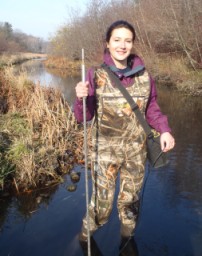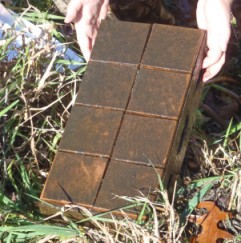Developing a Diatom-Based Bioassessment Tool in Ruddiman Creek

Diatoms are a group of algae with several attributes that make them useful as bioindicators of water quality in streams and rivers:
- Diatoms have short life cycles, making impacts on species detectable over relatively short time periods;
- Diatoms respond quickly to a variety of environmental conditions such as nutrient enrichment, high flow, and siltation; and
- Diatoms serve an important function in most streams, as they are a critical food resource for a variety of aquatic organisms such as invertebrates and fish.
Post-doctoral researcher Dr. Nadia Gillett is investigating whether the percentage of live diatoms can be used as an indicator of stress in urban streams.

Her research is taking place in Ruddiman Creek, an urban stream in the Muskegon Lake Area of Concern (AOC). The State of Michigan has placed this creek on its 303(d) list of impaired water bodies because of degraded fish and invertebrate communities.
The percentage of live vs. dead diatoms may be a robust indicator of environmental conditions. It may decrease with increased sedimentation (a major problem in urban streams) and assemblage age (older assemblages are less disturbed and therefore, have not been exposed to extreme, flashy flows). Recognizing live vs. dead diatom cells does not require special training and may be a user-friendly tool in ecological studies involving volunteers.
This new tool will provide helpful insight about the health of the diatom assemblage in Ruddiman Creek. If successful, not only will the new indicator help us to assess the environmental condition of Ruddiman Creek, but it also may be transferable to other urban systems throughout the region.
The Steinman Lab is currently studying Ruddiman Creeks hydrology and sediment load through a U.S. Environmental Protection Agency (U.S. EPA) Great Lakes Restoration Initiative (GLRI) project.
Dr. Nadia Gillett and her research are supported by the Paul C. Johnson Foundation and the Hines Corporation.
Contacts:
Nadia Gillett, Post-Doctoral Researcher: [email protected]
Al Steinman, Advisor: [email protected]

